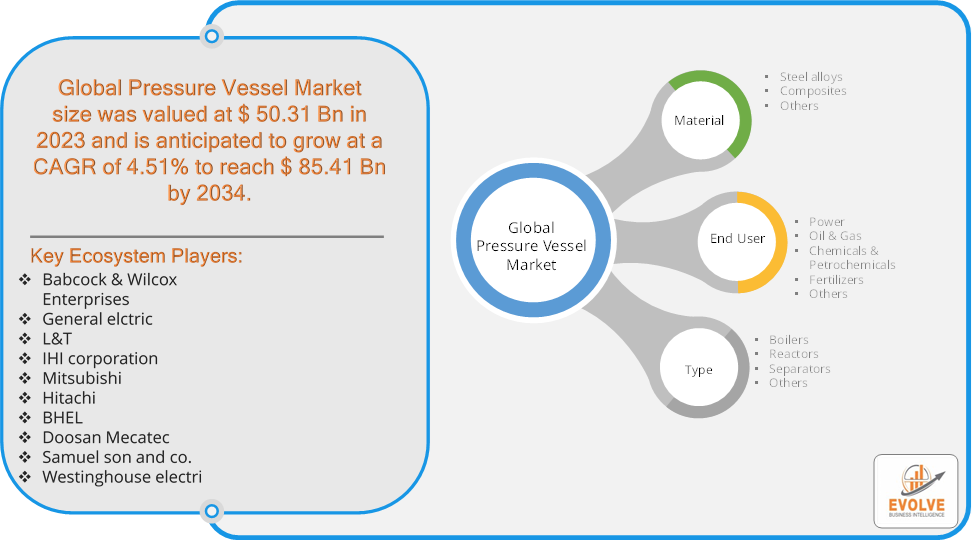Evolve Business Intelligence has published a research report on the Global Pressure Vessel Market, 2024–2034. The global Pressure Vessel Market is projected to exhibit a CAGR of around 4.51% during the forecast period of 2024 to 2034.
Evolve Business Intelligence has recognized the following companies as the key players in the global Pressure Vessel Market: Babcock & Wilcox Enterprises, General elctric, L&T, IHI corporation, Mitsubishi, Hitachi, BHEL, Doosan Mecatec, Samuel son and co. and Westinghouse electric.
The Global Pressure Vessel Market is projected to be valued at USD 85.41 Billion by 2034, recording a CAGR of around 4.51% during the forecast period. The Pressure Vessel Market refers to the global industry involved in the design, manufacture, and distribution of pressure vessels, which are containers designed to hold gases or liquids at high pressures. These vessels are used in various industries, including oil and gas, chemical processing, power generation, and pharmaceuticals. The market is driven by factors such as increasing energy demand, the expansion of industries that rely on pressure systems, and the need for efficient and safe storage solutions for gases and liquids under pressure.
The pressure vessel market is influenced by factors such as global economic growth, energy demand, technological advancements, and regulatory requirements.
Download the full report now to discover market trends, opportunities, and strategies for success.
Segmental Analysis
The global Pressure Vessel Market has been segmented based on Material, End User and Type
Based on Material, the Pressure Vessel Market is segmented into Steel alloys, Composites and Others. The Composites segment is anticipated to dominate the market.
Based on End User, the global Pressure Vessel Market has been divided into Power, Oil & Gas, Chemicals & Petrochemicals, Fertilizers and Others. The Chemicals & Petrochemicals segment is anticipated to dominate the market.
Based on Type, the global Pressure Vessel Market has been divided into Boilers, Reactors, Separators and Others. The Boilers segment is anticipated to dominate the market.
Regional Analysis
The Pressure Vessel Market is divided into five regions: North America, Europe, Asia-Pacific, South America, and the Middle East, & Africa. In North America region, the presence of a well-established oil & gas industry, growing investments in shale gas exploration, and advancements in chemical processing industries drive the demand for pressure vessels and the growing trend of replacing aging infrastructure, as well as the rising adoption of renewable energy projects like hydrogen energy, present opportunities for modern pressure vessel solutions. Europe region has stringent environmental regulations, a shift towards renewable energy sources (wind, solar, and hydrogen), and a strong presence of chemical and pharmaceutical industries and the European Green Deal and focus on carbon neutrality open up significant opportunities for pressure vessels in clean energy storage and waste management applications. Asia-Pacific has rapid industrialization, urbanization, and rising energy demands are key growth factors in emerging economies like China and India. Expansion in the chemical, petrochemical, and power generation sectors also supports market growth and has significant infrastructure development, coupled with investments in nuclear and renewable energy projects, creates high demand for pressure vessels across multiple sectors. The dominance of the oil & gas sector in the Middle East is a major driver, with pressure vessels playing a crucial role in refining and storage. In Africa, growing industrialization and energy projects offer additional demand. In Latin America region the growth in the oil & gas sector, particularly in Brazil, Venezuela, and Mexico, along with increasing investments in energy infrastructure, supports demand for pressure vessels and rising investment in renewable energy projects, especially hydropower and bioenergy, presents growth potential for pressure vessels in energy storage and power generation.

